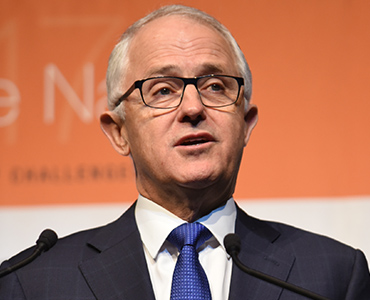Explore our Climate and Energy Hub
30/05/2017
 Education, reducing unemployment, enabling equal opportunity and a refusal to raise the combined top marginal tax rate were key focuses in the Prime Minister’s keynote address. Alongside chastising the Labor Government for their “grand schemes” in areas of health and education, which he said lacked in their funding, planning and implementation.
Education, reducing unemployment, enabling equal opportunity and a refusal to raise the combined top marginal tax rate were key focuses in the Prime Minister’s keynote address. Alongside chastising the Labor Government for their “grand schemes” in areas of health and education, which he said lacked in their funding, planning and implementation.
Speaking on taxes, Mr Turnbull said, “The Government will not support Labor's proposed amendment to the planned Medicare Levy rise, by applying it only to people who earn more than $87,000 a year, effectively taking Australia's combined top marginal tax rate to 49.5 per cent.”
"The last time the top rate plus the Medicare Levy was higher was in 1988–89, when it was 50.25 per cent.
"Returning to that bygone era would send a very poor signal to all Australian workers: don't bother trying to earn just over two times average full time weekly earnings.
“Because once you do, half of every additional bit of effort; half of every extra hour you work; half of every new idea you generate – indeed, half of your extra perseverance, determination and enterprise – belongs to the government.
“This undermines aspiration and fairness, while worsening incentives and economic efficiency."
Mr Turnbull also outlined his government’s goals for reducing unemployment and creating jobs, saying the government would be better targeting its support to give job seekers the tools they need. This would also entail providing the highest rate of subsidy to those with the lowest income.
“The disadvantage of joblessness is not just borne by those who are unemployed, it affects their family too. One of the greatest challenges facing successive governments is the number of jobless families in Australia, and the impact of intergenerational joblessness,” he said.
“The best way to share the opportunities that come with economic growth is to make sure families at risk have someone in a job, bringing home a regular pay cheque. This improves not only their prospects and living standards but that of their children for years to come.
“And so that is why every element of our economic policy is directed towards this goal – getting more people into jobs.”
Importantly, he said the Turnbull Government would not just be breaking down barriers to work, but supporting employers to create more jobs.
He explained his Government’s overall approach tied in with the recent removal of the 457 visa and introduction of two new work skills visas, in making sure Australians are “first in line for jobs”, while also allowing skilled migration, because “immigration policy is in a sense a recruiting tool.”
Speaking on education, Mr Turnbull said that Australia’s current performance was not good enough, especially in light of record increases in funding.
Mr Turnbull said, “Our NAPLAN results have not changed significantly over the last few years. Many have been the same since 2008.”
To tackle this issue, Mr Turnbull said the government would be bringing in transparent needs based funding.
“Our new needs based, transparent, consistent funding will address the mess (the Labor Government) has left us with,” Mr Turnbull said.
“Our funding model will correct the inequities and inconsistencies in the current system by ensuring students with the same needs attract the same support from the Commonwealth, regardless of where they live.”
Mr Turnbull said the government will be launching “Gonski 2.0” to advise how extra Commonwealth funding could improve test score results and educational outcomes.
He said the Liberal Government was committed to ensuring equal opportunity for all.
“If we recognise that all are born equal, then surely it follows that everyone deserves an equal chance of improving their stocks in life.”
He said he believed it was the government’s role to enable Australians to do their best, and to ensure that parents can work hard to ensure their children can do better than them.
“That is the very core of our egalitarian nation.”
Mr Turnbull also talked of his government’s commitment to putting the budget back in balance.
“We have made the tough and pragmatic decisions to put the Budget in a stronger position," Mr Turnbull said "Yes Liberals prefer lower taxes – but we dislike unsustainable deficits and mounting debt even more.”
State of the Nation: catch up here
Click here to see all the highlights from State of the Nation 2017
